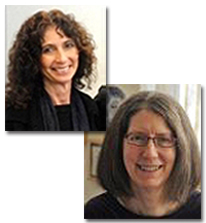Idie Benjamin and Dale Cooperman
“Awesome block construction!”
“Awesome cleanup, everyone!”
“Awesome phone!”
Awesome is breathtaking, magnificent, wonderful, amazing, stunning, staggering, imposing, stirring, impressive, formidable, fearsome, dreaded, marvelous, inspiring great admiration, apprehension, or fear
Awe filled with wonder, amazed, astonished, a feeling of reverential respect mixed with fear or wonder
- “Awesome must be the most over-used word in the English language.” (Barb Sanders, Ragan.com)
- Shirts are not awesome.
- Block constructions can be elaborate or complex, not awesome.
- Clean-up is expected, not awesome
- Cell phones and what they do can be pretty cool but tech is not awesome.
- Rainbows are awesome.
- Births are awesome.
- Trees bursting into bloom are awesome.
- Sunrises and sunsets are awesome.
- Moments that take our breath away, moments that bring us to intentionality and reflection, moments that remind us of God’s presence in the world and in our lives—well, those are awesome.
And as many have pointed out, we over use and misuse this word. It has lost its power as we use it throughout the day every day to describe everyday things, things as mundane as that new shirt. And we need this word! Our children need to understand – deep in their guts – this word in all its glory.
In the Torah (Deuteronomy 10:17), God is described as “…the great God, the mighty, and the awesome…” הַגָּדֹל הַגִּבֹּ וְהַנּוֹרָא – These words are repeated every day in the Amidah prayer. “Awesome” once only meant something very serious and special about God.
“There is fear that makes us shake, gives us dry mouth, and butterflies, and there is awe that causes us not to scream but to shout, Hallelujah! Wow! Amazing! When AJ Heschel was asked what it meant to believe in God, he said, “To have radical amazement.” (Marcia Drucker, “Radical Amazement – Yom Kippur Day 5764.”
Our great teacher Rabbi Abraham Joshua Heschel taught us this: “Our goal should be to live life in radical amazement. ….get up in the morning and look at the world in a way that takes nothing for granted. Everything is phenomenal; everything is incredible; never treat life casually. To be spiritual is to be amazed.”
Do our children experience radical amazement? Do their families? Do we? What is in our lives that can move us to deeply experience AWE? How truly sad it would be to live where we don’t experience that mouth-hanging-open kind of AWE in our everyday lives, or to teach that to our children.
There is a Midrash (a rabbinic story on the text) that adds a story to the Torah’s account of the splitting of the Reed Sea when the children of Israel left Egypt. The Midrash says that while present at the greatest miracle ever witnessed, two Israelites named Reuben and Shimon never looked up. They only looked down at the muddy sea bed. The entire crossing they looked down and complained vigorously about the mud. They were so focused on the ordinary that they missed the extraordinary, the awesome miracle.
We know that young children are egocentric and that it is our responsibility to gently and appropriately guide them as they learn that as special as they are, they are not the center of the universe. There is, however, a magnificent world created by God, and truly wondrous and awesome things happen in it, and our children and we are a part of that world. Awe and wonder help us to transcend to our better selves. If we, as Jewish educators take Heschel’s words to heart, these words will guide us as we move through our days with young children.
Our classrooms and schools must be places where we are always open to the possibility of an “awe” moment where wonder is noticed. Wonder can be in accomplishments and the achievement of goals or milestones, in the power of appreciation in the recitation of a blessing, whether it be for the food we eat or a “she-he-heyanu,” or from spending time outdoors exploring the natural world. We want children to understand the intensity of kindness to others and the reciprocity of that kindness bestowed on them by their teachers and their peers. We want them to feel the power of being together in the sacred space of our classroom.
Understanding “awesome” is understanding that a child’s spirituality must be nurtured and that families can help to join us in this work. We must live a life of intentionality in our Jewish classrooms, because when WE are intentional in the way we present the mundane things, we help to MAKE them awesome.
So find your moments – from hatched chicks to the first time tying of shoes to the smell of rain in spring… (and for you on the east coast this year, the arrival of spring after this long and arduous winter). Nurture the moments and cherish them.
Reshit Hokhmah yirat Adonai—The beginning of knowledge is a sense of awe. (Proverbs 1:7)
(Definitions – Google Dictionary)


